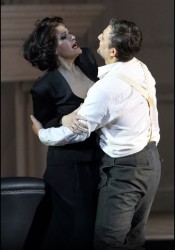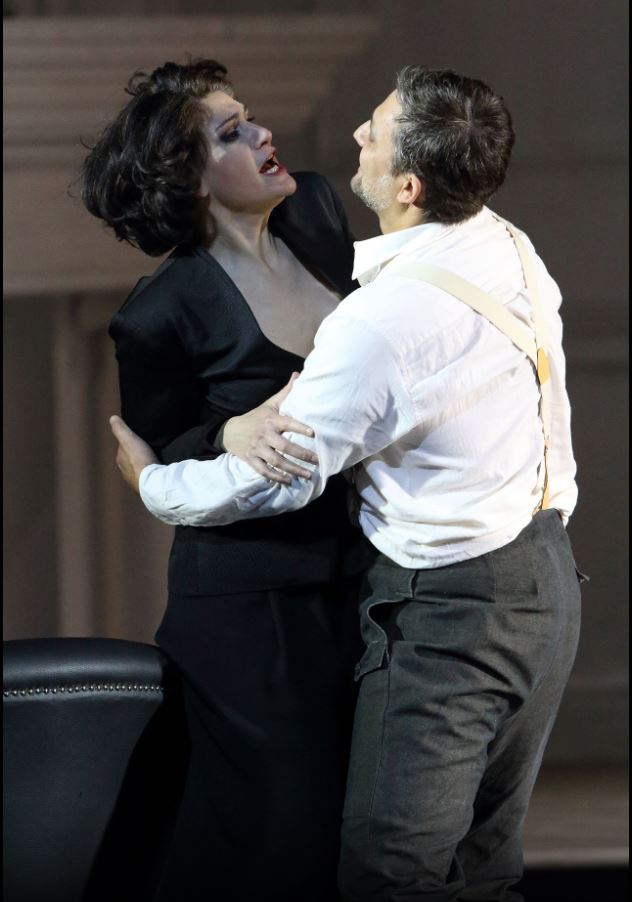 Germany Verdi, Otello: Soloists, Chorus and Orchestra of Bavarian State Opera / Kirill Petrenko (conductor), Nationaltheater, Munich, 21.12.2018. (ALL)
Germany Verdi, Otello: Soloists, Chorus and Orchestra of Bavarian State Opera / Kirill Petrenko (conductor), Nationaltheater, Munich, 21.12.2018. (ALL)

© W. Hösl
Production:
Director – Amélie Niermeyer
Settings – Christian Schmidt
Costumes – Annelies Vanlaere
Lighting – Olaf Winter
Cast:
Otello – Jonas Kaufmann
Desdemona – Anja Harteros
Iago – Gerald Finley
Cassio – Evan LeRoy Johnson
Emilia – Rachael Wilson
Lodovico – Bálint Szabó
Roderigo – Galeano Salas
Montano – Milan Siljanov
Herald – Markus Suihkonen
To fully appreciate this production of Otello one has to completely forget past performances and conceptions. What director Amélie Niermeyer has done is to provide a fresh, profound and convincing perspective on the work that manages to take into account both the story and the music, as well as, the characteristics, strengths and weaknesses of the principal singers.
The central character in Niermeyer’s conception is not Otello but Desdemona, present right from the start during the tempest scene. Otello enters to deliver his famous ‘Esultate’ alone, reminding us of soldiers suffering from post-traumatic stress disorder, who keep reliving their battles in their minds. The stage is divided into two parallel parts, and throughout the opera the action moves frequently from Otello’s to Desdemona’s world.
Desdemona is no longer a passive, innocent victim. At the end of Act I, she is the one kissing Otello, leading him to bed and trying to connect with him, but the music is very clear at this moment and he is the one reminiscing about his military exploits while she is the more tender one. At the very start of Act II, the couple leave without exchanging a word nor a loving glance, and one wonders if the wedding has even been consummated. In Act III, she is a commanding figure wearing black trousers with a red blouse.
We see before our very eyes what the work is really about: a couple disintegrating. Bergman meets Verdi …
As always with theatre directors, Personenregie (character development and characterisation) was strong, but Niermeyer also took cues from the music. A highlight was the second part of Act III, after the terrible ‘A terra!. . .e piangi’, with subtle lighting and imaginative use of video showing how things begin to collapse. The overall concept worked well with the singers. Anja Harteros has wonderful emotional range in addition to beauty of voice. Kaufmann, in this performance, displayed power in the high notes when needed. He tends to become baritonal in the middle register, which could even surprise many who are familiar with the Otellos of Domingo or Vickers. But it worked well here, creating a brooding Otello. Gerald Finley was a subtle Iago, careful with his words – one could hear echoes of the Mozart roles he has sung and perhaps, hopefully, of an upcoming Falstaff. Minor parts were cast with care, as is the rule in Munich. The chorus was terrific including the children’s’ chorus in Act II, perfectly in tune.
In the pit was Kirill Petrenko conducting his first Verdi opera. The orchestra played like lions for him, drawing a thrilling power from the opening scenes onwards. The cello section produced warm, glowing colours. The tempi were swift, contributing to the dramatic feeling. Balance between stage and pit was maintained with great care, no voice was covered at any moment. There was a strong sense of architecture with a long musical line particularly in the chorus passages of Act III. Petrenko truly is the leading conductor of our time.
In spite of the cold winter weather, coughs were minimal. The audience listened attentively. They knew what they were hearing was special, and one could hear a pin, sorry, a handkerchief drop.
This revealing production will be revived for the Munich Opera Festival in July 2019. It cannot be recommended strongly enough.
Antoine Lévy-Leboyer
For and earlier Seen and Heard Otello review click here.
